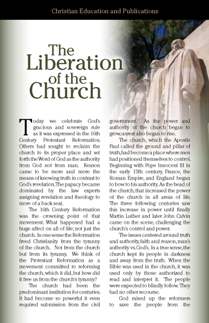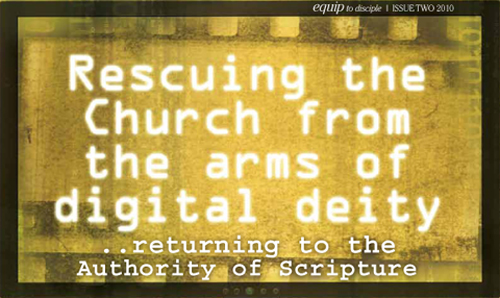
The Why
Your pastor went to seminary. During that time he learned the Bible, biblical languages, theology, church history, and how to preach. In other words, he was trained. When your church is preparing to select new elders and deacons, they are taught the basics of what the church is, how it is run, and their role in overseeing the church. In other words, they are trained.
Aside from the leadership, which group in the church would you say is the most important? My answer would be the teachers – on all levels. Think about the fact that these people are the ones we are entrusting with the very training of the next generation of your church. Do they deserve to be trained any less than those who oversee the church?
How would you respond to this? Your teachers come to you all excited about a new curriculum they discovered. The three basic truths taught are 1) Wisdom – I need to make the wise choice; 2) Faith – I can trust God no matter what; and 3) Friendship – I should treat others the way I want to be treated. Does this sound good to you? If it does, then you need more training than you know. These are not Biblical objectives, and you must know the difference if you are going to be able to protect your children from such teaching.
What biblical objectives should You be watching out for?
Great Commission Publications, our denomination’s official curriculum publisher, puts it this way:

 The 2010 Reformation Inserts are here! This year we celebrate Reformation Sunday on October 31st. Reformation Sunday is a time to celebrate our theological roots. It is a great opportunity to educate our congregations on the importance of what the Reformers did and the implications that it has for us today.
The 2010 Reformation Inserts are here! This year we celebrate Reformation Sunday on October 31st. Reformation Sunday is a time to celebrate our theological roots. It is a great opportunity to educate our congregations on the importance of what the Reformers did and the implications that it has for us today.
 I don’t mean to sound overdramatic, but we simply cannot bury our heads in our X-Boxes. As numerous studies attest, the relentless acquisition of cutting edge digital technology now lords over the Western cultural heart, extending across ethnic, gender, economic, and social boundaries. We must pause between texts, emails, and Seinfeld episodes to face the fact that technological lordship vies for the worship of God’s people in ourchurches. For too many, the knee is already bowed.
I don’t mean to sound overdramatic, but we simply cannot bury our heads in our X-Boxes. As numerous studies attest, the relentless acquisition of cutting edge digital technology now lords over the Western cultural heart, extending across ethnic, gender, economic, and social boundaries. We must pause between texts, emails, and Seinfeld episodes to face the fact that technological lordship vies for the worship of God’s people in ourchurches. For too many, the knee is already bowed. actually seek to preach the Bible? Recently in a worship service I attended at a Reformed church, which staunchly defends the inerrancy and sufficiency of Scripture, the preacher apologized two times for reading the Bible to the congregation. He was serious. The very Word he heralded as both authoritative and relevant required pardon from the congregation for its reading! Why? Perhaps because he knows his Blackberry and YouTube crowd might get bored listening to biblical texts. Or perhaps because he subconsciously doubts the power of the Word of God to do what God claims – to accomplish its purpose even in the heart of one in the embrace of the digital goddess. Whatever the case, in one tragic moment, he affirmed what many media-drunk churchgoers have come to believe: that public reading of Scripture, which the Apostle Paul alerts Timothy not to neglect (1 Tim 4:13), is a necessary boredom to endure; that preaching Scripture is an irrelevant part of our church experience.
actually seek to preach the Bible? Recently in a worship service I attended at a Reformed church, which staunchly defends the inerrancy and sufficiency of Scripture, the preacher apologized two times for reading the Bible to the congregation. He was serious. The very Word he heralded as both authoritative and relevant required pardon from the congregation for its reading! Why? Perhaps because he knows his Blackberry and YouTube crowd might get bored listening to biblical texts. Or perhaps because he subconsciously doubts the power of the Word of God to do what God claims – to accomplish its purpose even in the heart of one in the embrace of the digital goddess. Whatever the case, in one tragic moment, he affirmed what many media-drunk churchgoers have come to believe: that public reading of Scripture, which the Apostle Paul alerts Timothy not to neglect (1 Tim 4:13), is a necessary boredom to endure; that preaching Scripture is an irrelevant part of our church experience.